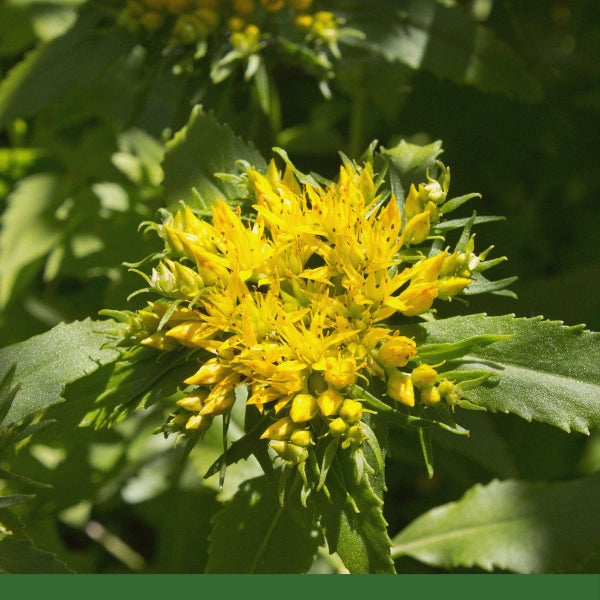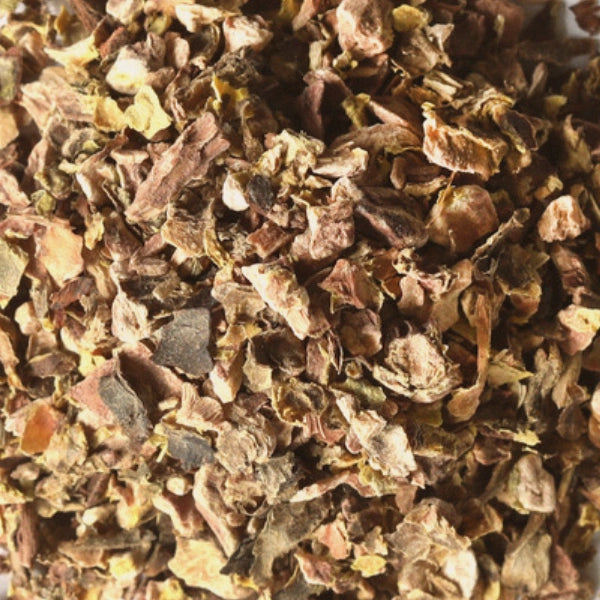Rhodiola Root (Rhodiola rosea) - Dried Herb, Organic
- Regular price
- $67.60
- Sale price
- $67.60
- Regular price
-
- Unit price
- per
Couldn't load pickup availability


Rhodiola also know by the names Arctic Rose, Golden Root, King’s Crown, Roseroot, Rosewort and Snowdown Rose. Rhodiola is a perennial flowering plant in the plant family Crassulaceae also known as the stonecrop family. It is a typical stonecrop plant, with a sturdy stem, succulent leaves and a waxy covering to reduce evaporation. The flowers are yellowish and can have reddish tips.
Rhodiola rosea grows at high altitude in cold regions of the world, including much of the Arctic, the mountains of Central Asia, scattered in eastern North America and mountainous parts of Europe. Rhodiola rosea is one of 90 rhodiola species, 55 species growing in China, 30 in Tibet and 3 species in North America, some of which can be used interchangeably for their medicinal properties. This species of Rhodiola has a fragrant rose smelling rhizome, hence the name of the specific name 'rosea'.
Rosea may grow up to 20 years before being harvested in the wild. Due to its popularity worldwide, overharvesting of wild rhodiola populations has become a threat. We support farm partners who organically cultivate rhodiola root to help ensure the future sustainability of the plant.
The use of Rhodiola for medicinal purposes dates back to the time of the Greek physician, Dioscorides, who documented its use in 77 CE. It has been used in folk medicine for more than a thousand years in Tibet, China, Russia and Siberia. Originally used as medicine in Tibet where it grows at an altitude of over 10,000 feet. Emperors from China used the Rhodiola from Siberia for medicinal purposes. Rhodiola was employed in Russia to boost the stamina of Olympic athletes and was even taken by Russian astronauts to support physical and mental performance.
In Siberia the harvesting and preparation of Rhodiola, referred to as "golden root", was a well-kept family secret among members of certain Siberian families who would transport Rhodiola rosea down ancient trails in the Altai and Caucasus mountains and trade it for Georgian wine, fruit, and honey. Rhodiola rosea has been categorized as an adaptogen by Russian researchers due to its observed ability to increase resistance to a variety of chemical, biological, and physical stressors.
Traditional folk medicine used R. rosea to increase physical endurance, work productivity, longevity, resistance to high altitude sickness; and to treat fatigue, depression, anemia, impotence, gastrointestinal ailments, infections and nervous system disorders.
In Traditional Chinese Medicine, this Root was considered to be a plant which nourished chi (energy or vital force) and the heart, while calming Shen. Shen can be translated as "spirit" or "mind", and implies our consciousness, mental functions, mental health, vitality and our "presence". Is is also said to encourage circulation, tonify kidneys and move blood.
Properties:
The taste and energetics of Rhodiola are slightly sweet, rose like flavour, bitter, cooling to slightly warming and drying. Rhodiola has an affinity to the immune system, endocrine system, nervous system, respiratory and circulatory systems, heart, spleen and kidneys. For an endocrine tonic combine Rhodiola with Ashwagandha, Holy Basil, Siberian Ginseng, Licorice or Schisandra. For an immune system tonic combine Rhodiola with Astragalus, Elderberries, Rosehips, or medicinal mushrooms like Chaga, Reishi or Cordyceps.
How to use:
1 teaspoon of Rhodiola root to one cup of boiling water. Steep for 20 minutes, strain and drink up to three cups a day.
Cautions & contraindications:
Rhodiola should not be prescribed to patients with antidepressant sensitivity. Can cause drowsiness for patients on benzodiazepines, SSRI and SNRI antidepressants. It is not recommended for patients on SSRI medications or MAOI medication because it can cause serotonin syndrome.
This information is for educational purposes only and is not intended to diagnose, treat or cure any disease or illness. Please consult your healthcare provider prior to the use of this product if you are pregnant, nursing, taking medications or have a medical condition. Individual results may vary.

